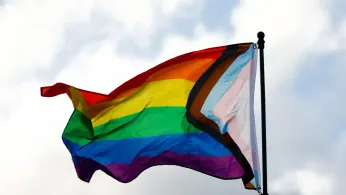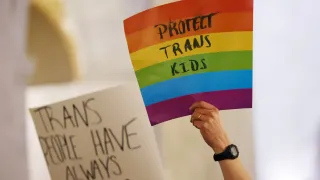
November 21, 2025
Florida Republicans Reintroduce Pride Flag Ban
READ TIME: 4 MIN.
For the fourth consecutive year, Florida lawmakers have introduced a measure targeting the public display of Pride flags and other banners representing marginalized identities on government property. House Bill 347, filed by Representative David Borrero, and its Senate companion, SB 426, sponsored by Senator Clay Yarborough, both Republicans, are the first anti-LGBTQ+ bills filed for the state’s 2026 session .
The legislative text prohibits any flag representing “race, gender, or sexual orientation” from being displayed on state or local government buildings. This includes city halls, county offices, public schools, and colleges . The ban would extend to any municipal flags that “acknowledge marginalized communities, ” a move that legal experts and advocates describe as unprecedented state interference in local governance .
If enacted, the legislation would:
- Ban Pride flags and other identity-based banners from public buildings statewide, including government offices and schools .
- Prohibit cities and counties from designing or adopting their own municipal flags if those flags recognize or celebrate marginalized or protected groups .
- Impose a civil penalty of $500 per day on government entities found in violation, with funds directed to the state’s General Revenue Fund .
- Require the U. S. flag to be flown above all other permitted flags on government property .
- Carve out explicit protections for “historical” flags, including Confederate symbols, which would remain permitted on government property .
The renewed push follows a summer of policies seen as targeting LGBTQ+ visibility. Governor Ron DeSantis ordered the removal of rainbow crosswalks and LGBTQ-themed murals in multiple Florida cities, citing alleged violations of roadway regulations . Critics argue these actions laid the political groundwork for the new legislative effort to further limit LGBTQ+ representation in public spaces.
LGBTQ+ advocacy organizations, including Equality Florida, have condemned the bill as an attack on visibility and inclusion. Joe Saunders, Senior Political Director at Equality Florida, stated, “This bill is a direct attack on LGBTQ visibility and a textbook example of government overreach and censorship. The Pride flag is a symbol of safety, inclusion, and community for millions of Floridians” .
Local civil rights groups have also criticized the bill’s attempt to centralize control over municipal symbols and flags, calling it an unprecedented intrusion into local self-governance . Equality Florida’s Public Policy Director, Jon Maurer, said, “Fights about legislation like this pride flag ban are distracting lawmakers from what they should really be focused on which are affordability and the issues impacting everyday Floridians” .
Supporters of the bill argue that only official flags—such as the U. S. and Florida state flags—should be flown on government property, and that flags representing specific communities or causes are inappropriate in public institutions . Jim Lennane, a Naples resident, stated, “Too often other flags are being flown for specific purposes. I think that those should be banned and only the national, and state and municipal flag should be shown. If any other flag is going to be permitted, let the legislature decide” .
However, critics, including local residents and civil rights advocates, warn that the bill could further divide communities and undermine efforts to foster inclusion. Yesi Hennessey, a community member, expressed concern that the ban “doesn’t build a good society – it divides the society” .
LGBTQ+ advocates emphasize that the Pride flag is more than a political symbol; it represents safety, acceptance, and belonging for queer and transgender Floridians. The proposed ban is seen as part of a broader trend of anti-LGBTQ+ legislation and administrative action in Florida, which has included restrictions on LGBTQ+ content in schools and public spaces over the past several years .
The exemption for “historical” flags, including those with Confederate imagery, is especially controversial. Advocates argue that this carve-out sends a message of selective inclusion and erasure, prioritizing divisive symbols with histories of racial oppression while banning symbols of LGBTQ+ pride and solidarity .
Previous iterations of the Pride Flag Ban have failed to advance in the Florida legislature, but the persistence of these efforts signals an ongoing political and cultural battle over LGBTQ+ visibility and local autonomy . With similar bills filed and defeated in three previous sessions, LGBTQ+ organizations are mobilizing early. Equality Florida has launched an action portal for Floridians to contact their lawmakers and urge them to oppose HB 347 and SB 426 .
National LGBTQ+ advocacy groups are closely watching Florida, noting that the bills form part of a larger national trend of proposed restrictions on LGBTQ+ expression and visibility. The interplay between state and local authority, the definition of “political” or “ideological” content, and the equal treatment of marginalized communities are likely to be central themes in legislative debates and any potential legal challenges .
As the 2026 legislative session approaches, Florida’s LGBTQ+ community and allies are preparing for another high-profile fight over visibility, inclusion, and the meaning of public symbols. While the outcome remains uncertain, the stakes are clear for those who view the Pride flag as a vital sign of support and safety for queer and transgender Floridians—and for those who believe government spaces should remain neutral on matters of identity and inclusion .






